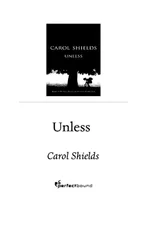These are just some of the scenes in Frances’s life. She thinks of them as scenes because they’re much too fragmentary to be stories and far too immediate to be memories. They seem to bloom out of nothing, out of the thin, uncolored air of defeats and pleasures. A curtain opens, a light appears, there are voices or music or sometimes a wide transparent stream of silence. Only rarely do they point to anything but themselves. They’re difficult to talk about. They’re useless, attached to nothing, can’t be traded in or shaped into instruments to prise open the meaning of the universe.
There are people who think such scenes are ornaments suspended from lives that are otherwise busy and useful. Frances knows perfectly well that they are what a life is made of, one fitting against the next like English paving-stones.
Or sometimes she thinks of them as little keys on a chain, keys that open nothing, but simply exist for the beauty of their toothed edges and the way they chime in her pocket.
Other times she is reminded of the Easter eggs her mother used to bring out every year. These were real hens’ eggs with a hole poked in the top and bottom and the contents blown out. The day before Easter, Frances and her mother always sat down at the kitchen table with paint brushes, a glass of water and a box of watercolors. They would decorate half a dozen eggs, maybe more, but only the best were saved from year to year. These were taken from a cupboard just before Easter, removed from their shoebox and carefully arranged, always on the same little pewter cake stand. The eggs had to be handled gently, especially the older ones.
Frances, when she was young, liked to pick up each one in turn and examine it minutely. She had a way of concentrating her thoughts and shutting everything else out, thinking only of this one little thing, this little egg that was round like the world, beautiful in color and satin to the touch, and that fit into the hollow of her hand as though it were made for that very purpose.
WE ARE FLYING OVER THE ROCKIES on our way to Vancouver, and there sits Ivy with her paperback. I ask myself: Should I interrupt and draw her attention to the grandeur beneath us?
In a purely selfish sense, watching Ivy read is as interesting as peering down at those snowy mountains. She turns the pages of a book in the same way she handles every object, with a peculiar respectful gentleness, as though the air around it were more tender than ordinary air. I’ve watched her lift a cup of tea with this same abstracted grace, cradling a thick mug in a way that transforms it into something precious and fragile. It’s a gift some people have.
I decide not to disturb her; utterly absorbed in what she’s reading, she’s seen the Rockies before.
In the seat ahead of us is a young man wearing a bright blue jacket—I remember that once I had a similar jacket in a similar hue. Unlike us, he’s clearly flying over the Rockies for the first time. He’s in a half-standing position at the window, snapping away with his camera, pausing only to change the film. From where I’m sitting I can see his intense, eager trigger hand, his steadying elbow, his dropped lower lip. In a week he’ll be passing his slides around the office, holding them delicately at their edges up to the light. He might set up a projector and screen them one evening in his living room; he might invite a few friends over, and his wife—who will resemble the Ivy of fifteen years ago—will serve coffee and wedges of cheese cake; these are the Rockies, he’ll say—magnificent, stirring, one of the wonders of the continent.
I tell myself that I would give a great deal to be in that young man’s shoes, but this is only a half-truth, the kind of lie Ivy and I sometimes spin for our own amusement. We really don’t want to go back in time. What we envy in the young is that fine nervous edge of perception, the ability to take in reality afresh. I suppose, as we grow older, that’s what we forfeit, acquiring in its place a measure of healthy resignation.
Ivy puts down her book suddenly and reaches for my hand. A cool, light, lazy touch. She’s smiling.
“Good book?”
“Hmmm,” she says, and stretches.
Now, as a kind of duty, I point out the Rockies.
“Beautiful,” she exclaims, leaning toward the window.
And it is beautiful. But unfortunately the plane is flying at a height that extracts all sense of dimension from the view. Instead of snow-capped splendor, we see a kind of Jackson Pollock dribbling of white on green. It’s a vast abstract design, a linking of incised patterns, quite interesting in its way, but without any real suggestion of height or majesty.
“It looks a little like a Jackson Pollock,” Ivy says in that rhythmic voice of hers.
“Did you really say that?”
“I think so.” Her eyebrows go up, her mouth crimps at the edges. “At least, if I didn’t, someone did.”
I lift her hand—I can’t help myself—and kiss her fingertips.
“And what’s that for?” she asks, still smiling.
“An attack of poignancy.”
“A serious new dietary disease, I suppose,” Ivy says, and at that moment the steward arrives with our lunch trays.
Ivy and I have been to Vancouver fairly often on business trips or for holidays. This time it’s different; in three months we’ll be moving permanently to Vancouver, and now the two of us are engaged in that common-enough errand, a house-hunting expedition.
Common, I say, but not for us.
We know the statistics: that about half of all North Americans move every five years, that we’re a rootless, restless, portable society. But for some reason, some failing on our part or perhaps simple good fortune, Ivy and I seem to have evaded the statistical pattern. The small stone-fronted, bow-windowed house we bought when Christopher was born is the house in which we continue to live after twenty years.
If there had been another baby, we would have considered a move, but we stayed in the same house in the middle of Toronto. It was close to both our offices and close too to the clinic Christopher needed. Curiously enough, most of our neighbors also stayed there year after year. In our neighborhood we know everyone. When the news of my transfer came, the first thing Ivy said was, “What about the Mattisons and the Levensons? What about Robin and Sara?”
“We can’t very well take everyone on the street along with us.”
“Oh Lordy,” Ivy said, and bit her lip. “Of course not. It’s only-”
“I know,” I said.
“Maybe we can talk Robin and Sara into taking their holidays on the coast next year. Sara always said—”
“And we’ll be back fairly often. At least twice a year.”
“If only-”
“If only what?”
“Those stupid bulbs.” (I love the way Ivy pronounces the word stupid: stewpid , giving it a patrician lift.)
“Bulbs?”
“Remember last fall, all those bulbs I put in?”
“Oh,” I said, remembering.
She looked at me squarely: “You don’t mind as much as I do, do you?”
“Of course I do. You know I do.”
“Tell me the truth.”
What could I say? I’ve always been impressed by the accuracy of Ivy’s observations. “The truth is—”
“The truth is—?” she helped me along.
“I guess I’m ready.”
“Ready for what?” Her eyes filled with tears. This was a difficult time for us. Christopher had died in January. He was a tough kid and lived a good five years longer than any of us ever thought he would. His death was not unexpected, but still, Ivy and I were feeling exceptionally fragile.
“Ready for what?” she asked again.
“For something,” I admitted. “For anything, I guess.”
Читать дальше












